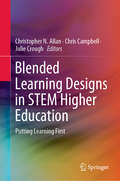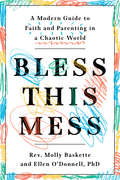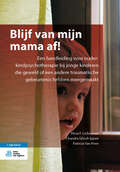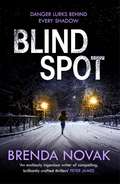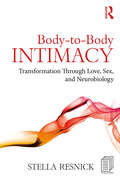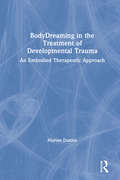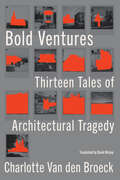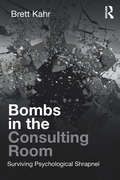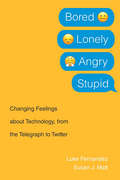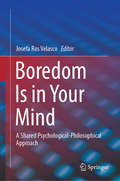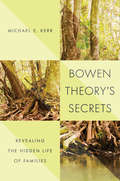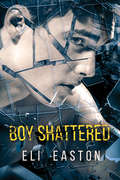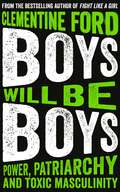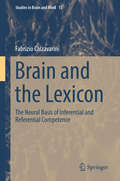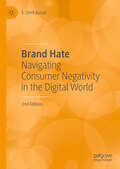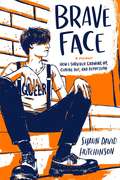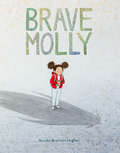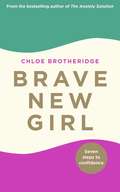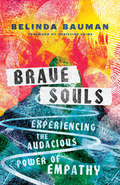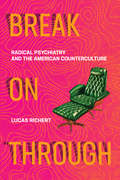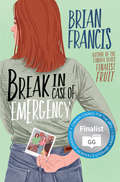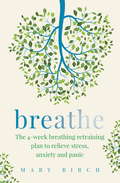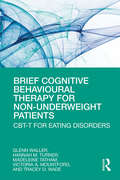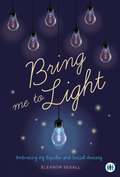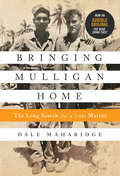- Table View
- List View
Blended Learning Designs in STEM Higher Education: Putting Learning First
by Chris Campbell Christopher N. Allan Julie CroughThis book offers a set of learning principles to support the design of rich learning experiences in Science, Technology, Engineering and Mathematics (STEM) higher education, including detailed evaluations and discussions for a variety of science subjects. Further, it presents a professional learning framework that can be used to support the implementation of blended learning technologies to increase buy-in from academic staff, to support grass roots initiatives, to develop a sense of community, and to sustain change. The principles developed here will help readers to think about blended learning from a learner’s perspective, put learning first, and develop activities that will help learners achieve better learning outcomes.In addition, the book addresses how to design rich, evidence-based, blended learning experiences that support learning. It demonstrates a range of learning principles in practice, with step-by-step instructions, and includes templates, supporting material, instructions and other resources to help teachers embed and adapt designs in their own subject. Readers will be equipped with an expanded toolkit of resources, designs, ideas and activities that can be directly applied in a variety of subject areas.
Bless This Mess: A Modern Guide to Faith and Parenting in a Chaotic World
by Rev. Molly Baskette Ellen O'DonnellA witty, compelling guide to raising open-minded and morally grounded kids in these crazy times, with an approach that’s rooted in science, psychology, and faith“Groundbreaking, profound, frank and friendly.”—Wendy Mogel, PhD, author of The Blessing of a Skinned KneeWhen Rev. Molly Baskette and Dr. Ellen O’Donnell first met, they were both new mothers seeking parenting wisdom. They read a lot of books on the topic, but none of them contained practical suggestions that would help their families psychologically and spiritually while maintaining their progressive values: How do we teach the art of forgiving and serving others? How do we raise kids who are tolerant, curious, and honorable? And what about the sex talk? Taking matters into their own hands, Baskette and O’Donnell began creating actionable steps addressing these questions and more. This book is the fruit of their many conversations begun long ago during the daycare carpool, from angsty moments to hallelujahs. In Bless This Mess, readers will gain constructive tools as they learn how to talk to their children about social justice, money, God, ethics, bullying, disabilities, sexuality, and their bodies. Parents will also glean insights on how to serve others with joy, give generously and gratefully, and—perhaps most important—learn how to stop being so afraid all the damn time, even while raising kids in an increasingly chaotic and often scary world. With real-life examples, relatable personal stories, and strategies tailored to the toddler, preteen, or teenager, Bless This Mess guides parents of children at all stages of their development.
Blijf van mijn mama af!: Een handleiding voor ouder-kindpsychotherapie bij jonge kinderen die geweld of een andere traumatische gebeurtenis hebben meegemaakt
by Alicia F. Lieberman Chandra Ghosh Ippen Patricia Van HornDit boek is een handleiding voor ouder-kindpsychotherapie (CPP, child-parent psychotherapy). Het richt zich op therapeuten die jonge tot zeer jonge kinderen (0 tot 5 jaar) behandelen die geweld of een andere traumatische gebeurtenis hebben meegemaakt. Het boek geeft theoretische achtergronden vanuit de psychoanalyse, de hechtingstheorie en de ontwikkelingspathologie. Ook geeft het voorbeelden van toe te passen interventies. Blijf van mijn mama af! laat zien dat ouder-kindpsychotherapie een waardevolle behandelvorm is voor jonge kinderen die getuige of slachtoffer zijn (geweest) van huiselijk geweld. De therapie kan ook worden toegepast bij andere vormen van trauma zoals emotionele, lichamelijke en seksuele mishandeling, blootstelling aan geweld, ernstige verwondingen, pijnlijke ziektes en medische behandelingen. De beschreven therapie is evidencebased en nadrukkelijk gericht op de relatie met de ouders of verzorgers van het kind. Hierbij is veel aandacht voor veiligheid en vertrouwen tegenover gevaar en angst. Van alle interventies worden voorbeelden gegeven aan de hand van vijf uitgebreide casussen en in de vorm van vele kortere vignetten. Deze, uit het Engels vertaalde, uitgave is een tweede, herziene druk van Don’t hit my mommy!, oorspronkelijk uitgegeven door ZERO TO THREE: National Center for Infants, Toddlers and Families in 2015. ‘Dit klassieke werk is gebaseerd op tientallen jaren ervaring van de auteurs als therapeut en opleider. De toepassing van ouder-kindpsychotherapie (CPP) is sinds verschijning van het oorspronkelijke boek aanzienlijk uitgebreid, met name voor gezinnen die te maken hebben met geweld, op basis van een indrukwekkende hoeveelheid wetenschappelijk bewijs en steeds meer trainers. Naast een rijke hoeveelheid andere hulpmiddelen biedt het boek vele gedetailleerde, fijngevoelige en helder geschreven voorbeeldcasussen die laten zien hoe je ouders en jonge kinderen kunt bijstaan bij het genezen van trauma’s. Ik raad u aan het te lezen, en te herlezen.’ – Charles H. Zeanah jr., MD, Institute of Infant and Early Childhood Mental Health, Tulane University
Blind Spot: A unputdownable new thriller to keep you reading all night! (Evelyn Talbot #4)
by Brenda Novak'An endlessly ingenious writer of compelling, brilliantly crafted thrillers' Peter JamesNew York Times bestseller Brenda Novak's fourth novel in the Evelyn Talbot series sees the return of psychiatrist Dr Evelyn Talbot. When you're studying America's most terrifying psychopaths, can you ever really be safe? This is SILENCE OF THE LAMBS meets Karen Rose...SOMETIMES THE DARKEST DEEDS HAPPEN IN BROAD DAYLIGHT... With her tortured past finally behind her - and her tormentor, Jasper Moore, locked up, where she can study him along with the other psychopaths at Hanover House - psychiatrist Evelyn Talbot is looking to the future. She's about to have a baby and marry her long-time love, Amarok, the only police presence in Hilltop, Alaska. But when she's snatched from her own driveway, she can only guess at who's taken her captive...and why. Struggling to survive in a tiny, airless cell, Evelyn is relying on Amarok to find her. But he won't have much to go on, a point that becomes even more alarming when her captor reveals a clue to the mastermind behind her abduction. Not only does she know him, she knows he has a particularly gruesome method of disabling his victims. So unless she manages to escape, neither she nor her baby will survive...Look for the other gripping novels in the Evelyn Talbot series - Her Darkest Nightmare, Hello Again, Face Off, and the prequel novella, Hanover House, available now.
Body-to-Body Intimacy: Transformation Through Love, Sex, and Neurobiology
by Stella ResnickThis book presents an integrative, growth-oriented approach to therapy with couples that demonstrates the dynamic interplay between partners’ emotional issues and their sexual difficulties. It offers a model for relational and sexual enhancement that focuses as much on partners’ present, nonverbal body-to-body communications as on their words. Dr. Stella Resnick draws on research from interpersonal neurobiology, sexology, positive psychology, and Gestalt therapy, and shares a rich assortment of therapy vignettes to demonstrate the transformative power of pleasure and how a focus on body-to-body intimacy can heal emotional wounds from the past and encourage greater presence, empathy, authenticity, playfulness, and sexual pleasure between intimate partners. The therapeutic process is explored in four related spectrums: the Problem-Transformation Spectrum, the Attachment-Sexuality Spectrum, the Pain-Pleasure Spectrum, and the Cognitive-Somatic-Experiential-Behavioral-Spectrum. Part I lays the theoretical foundation for the work. Part II examines the early attachment bond between parent and child and its effects on adult capacity for emotional closeness and sexual pleasure. Part III offers methods for resolving painful emotional issues underlying many sexual difficulties. Finally, Part IV describes the procedure for moving from a cognitive reframing of the problem to a somatic focus on the body and tracking present-moment emotional interactions to the repair of relational injuries that nurture transformational change. Also included is a series of process-oriented exercises and a handout that therapists can use in their own practice. Body-to-Body Intimacy will enable couples and sex therapists to expand their practices and enrich their clients’ sexual and relational dynamics. This book also contains valuable information that will be appreciated by anyone interested in a greater understanding of a growth-oriented therapeutic process for couples and what can be achieved together by gaining a deeply loving and sexually fulfilling intimate love relationship.
BodyDreaming in the Treatment of Developmental Trauma: An Embodied Therapeutic Approach
by Marian DunleaMarian Dunlea’s BodyDreaming in the Treatment of Developmental Trauma: An Embodied Therapeutic Approach provides a theoretical and practical guide for working with early developmental trauma. This interdisciplinary approach explores the interconnection of body, mind and psyche, offering a masterful tool for restoring balance and healing developmental trauma. BodyDreaming is a somatically focused therapeutic method, drawing on the findings of neuroscience, analytical psychology, attachment theory and trauma therapy. In Part I, Dunlea defines BodyDreaming and its origins, placing it in the context of a dysregulated contemporary world. Part II explains how the brain works in relation to the BodyDreaming approach: providing an accessible outline of neuroscientific theory, structures and neuroanatomy in attunement, affect regulation, attachment patterns, transference and countertransference, and the resolution of trauma throughout the body. In Part III, through detailed transcripts from sessions with clients, Dunlea demonstrates the positive impact of BodyDreaming on attachment patterns and developmental trauma. This somatic approach complements and enhances psychobiological, developmental and psychoanalytic interventions. BodyDreaming restores balance to a dysregulated psyche and nervous system that activates our innate capacity for healing, changing our default response of "fight, flight or freeze" and creating new neural pathways. Dunlea’s emphasis on attunement to build a restorative relationship with the sensing body creates a core sense of self, providing a secure base for healing developmental trauma. Innovative and practical, and with a foreword by Donald E. Kalsched, BodyDreaming in the Treatment of Developmental Trauma: An Embodied Therapeutic Approach will be essential reading for psychotherapists, analytical psychologists and therapists with a Jungian background, arts therapists, dance and movement therapists, and body workers interested in learning how to work with both body and psyche in their practices.
Bold Ventures: Thirteen Tales of Architectural Tragedy
by Charlotte Van den BroeckA prize-winning Belgian poet explores the nature of creative endeavor—the godlike ambition, the crushing defeat of failure—through the stories of thirteen tragic architects. In thirteen fascinating chapters, Charlotte Van den Broeck goes in search of buildings that were fatal to their architects—architects who either killed themselves or are rumored to have done so. They range across time and space from a church with a twisted spire in seventeenth-century France to a theater that collapsed mid-performance in 1920s Washington, DC, and an eerily sinking swimming pool in the author&’s hometown. Drawing on a vast range of material, from Hegel and Darwin to art history, stories from her own life, and popular culture, Van den Broeck brings patterns into focus as she asks, What is that strange, life-or-death connection between a creation and its creator? Threaded through each story is the author&’s meditation on the question of suicide—what Albert Camus called the &“one truly serious philosophical problem&”—in relation to creativity and public disgrace. The result is a profoundly idiosyncratic book, breaking ground in literary nonfiction, as well as providing solace and consolation to anyone who has ever attempted a creative act.
Bombs in the Consulting Room: Surviving Psychological Shrapnel
by Brett KahrWhat does one do when a dangerous paedophile, nearly six feet seven inches in height, threatens to kill you? How does one manage when a brain-damaged, psychotic patient spits on the office floor two hundred times during the first consultation? And what does one say when one member of a warring couple reveals the most horrific acts of sexual cruelty? In perhaps his most gripping book to date, Professor Brett Kahr offers colleagues a detailed glimpse into the challenge of working with highly distressed and disturbing individuals in long-term psychotherapy. Kahr explains the ways in which such deeply troubled people hurl "bombs" into the consulting room, leaving considerable "psychological shrapnel" in their wake. The book contains five sensitively and compellingly written clinical chapters, followed by several historical chapters which explore the ways in which Donald Winnicott attempted to manage the bombs in his consulting room, often of his own making. Kahr then examines the pioneering contribution of Enid Eichholz (later Enid Balint) who, during the Second World War, created marital psychoanalysis as a means of dealing with couples ravaged by actual wartime bombs. The book concludes with an historico-clinical chapter on how thoughtful and sophisticated classical interpretation can reduce the impact of clinical bombs. Kahr even provides us with an examination of his favourite "top ten" interpretations in the history of psychoanalysis! A unique and helpful volume, written by a practitioner steeped equally in psychoanalysis and history, Bombs in the Consulting Room: Surviving Psychological Shrapnel will be essential reading for anyone who has ever felt frightened while treating patients.
Bored, Lonely, Angry, Stupid: Changing Feelings about Technology, from the Telegraph to Twitter
by Luke FernandezFacebook makes us lonely. Selfies breed narcissism. On Twitter, hostility reigns. Pundits and psychologists warn that digital technologies substantially alter our emotional states. But Luke Fernandez and Susan Matt show that technology doesn’t just affect how we feel from moment to moment—it changes profoundly the underlying emotions themselves.
Boredom Is in Your Mind: A Shared Psychological-Philosophical Approach
by Josefa Ros VelascoThis book offers a unique perspective on the topic of boredom, with chapters written by diverse representatives of various mental health disciplines and philosophical approaches. On one hand, studying boredom involves the mental processes of attention, memory, perception, creativity, or language use; on the other, boredom can be understood by taking into account many pathological conditions such as depression, stress, and anxiety. This book seeks to fill the knowledge gap in research by discussing boredom through an interdisciplinary dialogue, giving a comprehensive overview of the past and current literature within boredom studies, while discussing the neural bases and causes of boredom and its potential consequences and implications for individual and social well-being. Chapters explore the many facets of boredom, including:Understanding the cognitive-affective mechanisms underlying experiences of boredomPhilosophical perspectives on boredom, self-consciousness, and narrativeHow boredom shapes both basic and complex human thoughts, feelings, and behavior Analyzing boredom within Freudian and Lacanian frameworks Boredom Is in Your Mind: A Shared Psychological-Philosophical Approach is a pioneering work that brings together threads of cross-disciplinary boredom research into one comprehensive resource. It is relevant for graduate students and researchers in myriad intersecting disciplines, among them cognitive psychology, cognitive neurosciences, and clinical psychology, as well as philosophy, logic, religion, and other areas of the humanities and social sciences.
Bowen Theory's Secrets: Revealing The Hidden Life Of Families
by Michael E. KerrA much-needed update to one of the most significant family therapy theories of the past century. Murray Bowen (1931–1990) was the first to study the family in a live-in setting and describe specific details about how families function as systems. Despite Bowen theory being based on research begun more than seventy years ago, the value of viewing human beings as profoundly emotionally-driven creatures and human families functioning as emotional units is more relevant than ever. This book, written by one of his closet collaborators, updates his still-radical theory with the latest approaches to understanding emotional development. Reduced to its most fundamental level, Bowen theory explains how people begin a relationship very close emotionally but become more distant over time. The ideas also help explain why good people do bad things, and bad people do good things, and how family life strengthens some members while weakening others. Gaining knowledge about previously unseen specifics of family interactions reveals a hidden life of families. The hidden life explains how the best of intentions can fail to produce the desired result, thus providing a blueprint for change. Part I of the book explains the core ideas in the theory. Part II describes the process of differentiation of self, which is the most important application of Bowen theory. People sometimes think of theories as "ivory tower" productions: interesting, but not necessarily practical. Differentiation of self is anything but; it has a well-tested real-world application. Part II includes four long case presentations of families in the public eye. They help illustrate how Bowen theory can help explain how families—three of which appear fairly normal and one which does not—unwittingly produce an offspring that chronically manifests some time of severely aberrant behavior. Finally, the book proposes a new "unidisease" concept—the idea that a wide range of diseases have a number of physiological processes in common. In an Epilogue, Kerr applies Bowen theory to his family to illustrate how changes in a family relationship system over time can better explain the clinical course of a chronic illness than the diagnosis itself. With close to four thousand hours of therapy conducted with about thirty-five hundred families over decades, Michael Kerr is an expert guide to the ins and outs of this most influential way of approaching clinical work with families.
Boy Shattered
by Eli EastonPopular athlete Brian had everything until a school shooter nearly killed him. He survived the massacre with the help of a hero—his classmate Landon, who faced death to help others… and who is openly gay. Brian might be alive, but he can’t face his fears or move on, especially since the shooters were never caught. He’s falling apart, and he can only reach for Landon and hope Landon will take his hand a second time. Landon did what anyone would do when he found Brian dying on the cafeteria floor. He doesn’t think of himself as a hero, but he’s ready to take a stand against the gun violence tearing apart the lives of young people—people like Brian, who returned to school a shadow of the happy, outgoing quarterback Landon used to admire. Brian still needs him, and as their friendship grows and deepens, wounds might begin to heal. The bond they share could lead a new start for them both. Only the terror that visited Jefferson Waller High School isn’t over yet.
Boys Will Be Boys: Power, Patriarchy and Toxic Masculinity
by Clementine FordThe incendiary new book about toxic masculinity and misogyny from Clementine Ford, author of the best-selling feminist manifesto, Fight Like A Girl. Fearless feminist heroine Clementine Ford&’s incendiary first book, Fight Like A Girl, is taking the world by storm, galvanising women to demand and fight for real equality and not merely the illusion of it. Now Boys Will Be Boys examines what needs to change for that equality to become a reality. It answers the question most asked of Clementine: 'How do I raise my son to respect women and give them equal space in the world? How do I make sure he's a supporter and not a perpetrator?' Ford demolishes the age-old assumption that superiority and aggression are natural realms for boys, and demonstrates how toxic masculinity creates a disturbingly limited and potentially dangerous idea of what it is to be a man. Crucially, Boys Will Be Boys reveals how the patriarchy we live in is as harmful to boys and men as it is to women and girls, and asks what we have to do to reverse that damage. The world needs to change and this book shows the way.
Brain and the Lexicon: The Neural Basis of Inferential and Referential Competence (Studies in Brain and Mind #15)
by Fabrizio CalzavariniThis monograph offers a novel, neurocognitive theory concerning words and language. It explores the distinction between inferential and referential semantic competence. The former accounts for the relationship of words among themselves, the latter for the relationship of words to the world. The author discusses this distinction at the level of the human brain on both theoretical and neuroscientific grounds. In addition, this investigation considers the relation between the inf/ref neurocognitive theory and other accounts of semantic cognition proposed in the field of neurosemantics, as well as some potential implications of the theory for clinical neuroscience and the philosophy of semantics. Overall, the book offers an important contribution to the debate about lexical semantic competence. It combines a strong philosophical and linguistic background with a comprehensive and critical analysis of neurosemantic literature. Topics discussed lie at the intersection of philosophical semantics, linguistics, neurolinguistics, cognitive science, artificial intelligence, cognitive neuroscience, and clinical psychology. Due to its interdisciplinary orientation, coverage is rich in introductory remarks and not overly technical, therefore it is accessible to non-experts as well.
Brand Hate: Navigating Consumer Negativity in the Digital World
by S. Umit KucukThis book focuses on the concept of “brand hate” and consumer negativity in today’s digital markets. It explores the emotional detachment consumers generate against valued brands and how negative experiences affect their and other consumers' loyalty. It is almost impossible not to run into hateful language about companies and their brands in today’s digital consumption spaces. Consumer hostility and hate is not hidden and silent anymore but is now openly shared on many online anti-brand websites, consumer social networking sites, and complaint and review boards. The book defines consumer brand hate and discusses its dimensions, antecedents, and consequences as well as the semiotics and legality of such brand hate activities based on current brand dilution arguments. It describes the situations which lead to anti-branding and how consumers choose to express their dissatisfaction with a company on individual and social levels. This newly updated edition discusses recent research findings from brand hate literature with new cases and extended managerial analysis. Thus, the book provides strategic perspectives on how to handle such situations to achieve better functioning markets for scholars and practitioners in marketing, psychology, and consumer behavior.
Brave Face: A Memoir
by Shaun David HutchinsonCritically acclaimed author of We Are the Ants—described as having “hints of Vonnegut’s Slaughterhouse-Five” (School Library Journal)—opens up about what led to an attempted suicide in his teens, and his path back from the experience. <P><P>“I wasn’t depressed because I was gay. I was depressed and gay.” <P><P> Shaun David Hutchinson was nineteen. Confused. Struggling to find the vocabulary to understand and accept who he was and how he fit into a community in which he couldn’t see himself. The voice of depression told him that he would never be loved or wanted, while powerful and hurtful messages from society told him that being gay meant love and happiness weren’t for him. A million moments large and small over the years all came together to convince Shaun that he couldn’t keep going, that he had no future. And so he followed through on trying to make that a reality. Thankfully Shaun survived, and over time, came to embrace how grateful he is and how to find self-acceptance. In this courageous and deeply honest memoir, Shaun takes readers through the journey of what brought him to the edge, and what has helped him truly believe that it does get better.
Brave Molly: (empowering Books For Kids, Overcoming Fear Kids Books, Bravery Books For Kids)
by Brooke Boynton-HughesWhat do you do when no one can see your monsters but you? At first, Molly runs from them. But they follow her down the sidewalk, getting in the way when she tries to make a new friend, popping up unexpectedly out of shadows, and multiplying. Until finally...Molly faces her fears. Author-illustrator Brooke Boynton-Hughes delivers a modern classic in this moving adventure that honors everyday acts of bravery and the power of friendship to banish the monsters that haunt us.
Brave New Girl: Seven Steps to Confidence
by Chloe BrotheridgeHarness your inner stength, confidence and stability with the essential guide from renowned hypnotherapist, host of The Calmer You podcast and bestselling author of The Anxiety SolutionIt's time to be the happiest, most confident and content version of yourself . . .'The only way to improve our confidence - in any area of life - is by pushing through our comfort zone . . . This straightforward guide will show you how' Evening Standard, Books to Read for Better Mental Health___________Confidence is not something we either have or don't have - it can be built, and this straightforward guide will show you how.Renowned clinical hypnotherapist and anxiety expert Chloe Brotheridge has helped hundreds of clients with anxiety and low self-confidence, and in this book will use her own stories, scientific research, and the experiences of other women to show you how to:· Feel more confident· Spend less time worrying and people-pleasing· Build self-belief· Reach your full potential· Assertively set boundaries for a happier, healthier youBrave New Girl reveals how everyone can follow their path to confidence.'A straightforward guide . . . she uses her own stories, scientific research and the experiences of other women to show her readers how to feel more confident' StylistAs seen in The Guardian, Mirror and Daily ExpressPraise for The Anxiety Solution:'Remarkable, pioneering, could change your life' Daily Mail
Brave Souls: Experiencing the Audacious Power of Empathy
by Belinda BaumanWhat if empathy could save us? Belinda Bauman was living a comfortable life as a wife, mother, and nonprofit leader—but her soul was checked out. Then she met Esperance. An assault survivor living in one of the poorest, most dangerous countries in the world, Esperance and other Congolese women shared their harrowing stories with Belinda. Their vulnerability set Belinda on a path of embracing empathy. If Esperance could love in the face of so much pain, maybe there is hope for the world too. From the top of Mount Kilimanjaro to the borders of war-torn Syria, Belinda takes readers along her journey to empathy. With cutting-edge neuroscience, biblical parables, and stories of brave women from across the globe, she offers readers direction for seeing others' perspectives, listening well, and redeeming conflict. She casts a vision for lives and communities transformed by everyday Christians practicing empathy as a spiritual discipline. Join Belinda on a journey to be brave—and see your world changed.
Break On Through: Radical Psychiatry and the American Counterculture
by Lucas Richert“Antipsychiatry,” Esalen, psychedelics, and DSM III: Radical challenges to psychiatry and the conventional treatment of mental health in the 1970s.The upheavals of the 1960s gave way to a decade of disruptions in the 1970s, and among the rattled fixtures of American society was mainstream psychiatry. A “Radical Caucus” formed within the psychiatric profession and the “antipsychiatry” movement arose. Critics charged that the mental health establishment was complicit with the military-industrial complex, patients were released from mental institutions, and powerful antipsychotic drugs became available. Meanwhile, practitioners and patients experimented with new approaches to mental health, from primal screaming and the therapeutic use of psychedelics to a new reliance on quantification. In Break on Through, Lucas Richert investigates the radical challenges to psychiatry and to the conventional treatment of mental health that emerged in the 1970s and the lessons they offer for current debates.Drawing on archives and government documents, medical journals, and interviews, and interweaving references to pop (counter)culture into his account, Richert offers fascinating stories of the decade's radical mental health practices. He discusses anti–Vietnam War activism and the new diagnosis of post–traumatic stress disorder given to some veterans; the radical psychiatrists who fought the system (and each other); the entry of New Age–style therapies, including Esalen's Human Potential Movement, into the laissez-faire therapeutic marketplace of the 1970s; the development of DSM III; and the use of LSD, cannabis, and MDMA. Many of these issues have resonance today. Debates over medical marijuana and microdoses of psychedelics echo debates of the 1970s. With rising rates of such disorders as anxiety and depression, practitioners and patients continue to search for therapeutic breakthroughs.
Break in Case of Emergency: A Novel
by Brian FrancisDads can be such a dragLife has been a struggle for Toby Goodman. Her mother died by suicide five years ago, and her father left their small town before Toby was born. Now a teenager living on her grandparents’ dairy farm, Toby has trouble letting people in. She keeps even her closest friend, the brash but endearing Trisha, at arms’ length, and recently ended her first relationship, with Trisha’s burnout brother, Mike. Convinced that she is destined to follow her mother’s path, Toby creates a plan to escape her pain.But with the news that her father is coming home and finally wants to meet her, Toby must face the truth of her family’s story. Not only is her father gay, but he’s also a world-famous female impersonator—and a self-absorbed, temperamental man-child who is ill-prepared to be a real parent. When Toby’s careful plans go awry, she is forced to rebuild the life she thought she knew from the ground up. While she may not follow an expected path, through the support of a quirky but lovable circle of friends and family, Toby may finally put together the many different pieces that make up her past, her present, and her future.
Breathe: The 4-week breathing retraining plan to relieve stress, anxiety and panic
by Mary BirchGet back to basics and transform your life with this simple four-week, step-by-step breathing retraining program.In her years of teaching breathing retraining, Mary Birch has found that the majority of her clients experiencing symptoms of panic, anxiety and stress are overbreathing, sometimes significantly. Generally, they are not aware that they are overbreathing, or that this is linked to symptoms. Reducing breathing to the normal level has an enormous impact on reducing stress, anxiety, and panic and restoring a sense of calm.Most people will begin to feel an improvement in their symptoms within a week of implementing the strategies contained in this book, sometimes even within a few days. But Mary recommends a minimum four-week breathing retraining program for a reason: the body has to adjust to the new and improved breathing pattern, and this needs to become automatic, so that you do not revert to a disordered breathing pattern and chronic overbreathing in times of stress.Part 1 of this book provides an explanation of the link between overbreathing and stress, anxiety and panic symptoms. Part 2 contains a four-week program with weekly guidelines to help people experiencing these issues to improve their breathing pattern and gain long-term relief.If you struggle with symptoms of panic, stress or anxiety, this book could help change your life in a matter of weeks.
Brief Cognitive Behavioural Therapy for Non-Underweight Patients: CBT-T for Eating Disorders
by Victoria Mountford Tracey Wade Hannah Turner Madeleine Tatham Glen WallerMost people with eating disorders struggle to find an effective therapy that they can access quickly. Brief Cognitive Behavioural Therapy for Non-Underweight Patients: CBT-T for Eating Disorders presents a new form of cognitive behavioural therapy (CBT) that is brief and effective, allowing more patients to get the help that they need. CBT is a strongly supported therapy for all adults and many adolescents with eating disorders. This 10-session approach to CBT (CBT-T) is suitable for all eating disorder patients who are not severely underweight, helping adults and young adults to overcome their eating disorder. Using CBT-T with patients will allow clinicians to treat people in less time, shorten waiting lists, and see patients more quickly when they need help. It is a flexible protocol, which fits to the patient rather than making the patient fit to the therapy. Brief Cognitive Behavioural Therapy for Non-Underweight Patients provides an evidence-based protocol that can be delivered by junior or senior clinicians, helping patients to recover and go on to live a healthy life. This book will appeal to clinical psychologists, psychiatrists, psychotherapists, dietitians, nurses, and other professionals working with eating disorders.
Bring Me to Light: Embracing My Bipolar and Social Anxiety (Inspirational Series)
by Eleanor SegallEleanor Segall's life was beginning. An aspiring actress and a family girl, she never thought her future would be derailed by mental illness. After a spate of depressive episodes, panic attacks and social anxiety, Eleanor found herself in The Priory at age 16. The diagnosis? Bipolar affective disorder.But Eleanor didn't let it stop her for long. Now a successful blogger, journalist, and pillar of the mental health and Jewish communities, she writes about finding recovery and hope after being unwell. Her story is of picking herself back up again and surviving against the odds. It will resonate with many - and it can help them find that light in the darkness too.
Bringing Mulligan Home: The Long Search for a Lost Marine
by Dale MaharidgeSergeant Steve Maharidge returned from World War II an angry man. The only evidence that he'd served in the Marines was a photograph of himself and a buddy tacked to the basement wall. On one terrifyingly memorable occasion his teenage son, Dale, witnessed Steve screaming at the photograph: "They said I killed him! But I didn't kill him! It wasn't my fault!”After Steve died, Dale Maharidge began a twelve-year quest to face down his father's wartime ghosts. He found more than two dozen members of Love Company, the Marine unit in which his father had served. Many of them, now in their eighties, finally began talking about the war. They'd never spoken so openly and emotionally, even to their families. Through them, Maharidge brilliantly re-creates Love Company's battles and the war that followed them home. In addition, Maharidge traveled to Okinawa to experience where the man in his father's picture died and meet the families connected to his father's wartime souvenirs.The survivors Dale met on both sides of the Pacific Ocean demonstrate that wars do not end when the guns go quiet-the scars and demons remain for decades. Bringing Mulligan Home is a story of fathers and sons, war and postwar, silence and cries in the dark. Most of all it is a tribute to soldiers of all wars-past and present-and the secret burdens they, and their families, must often bear.
